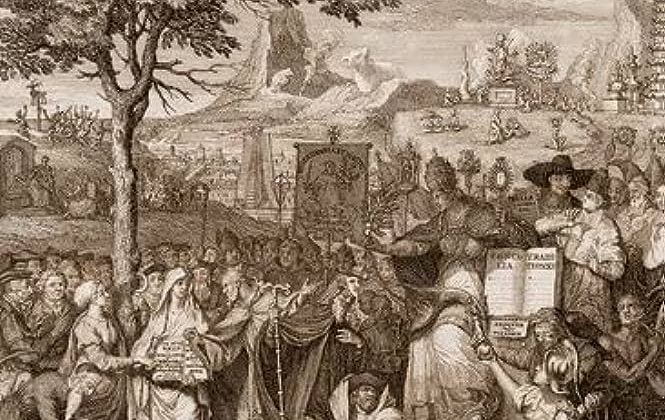

Mark Valeri is the Reverend Priscilla Wood Neaves Distinguished Professor of Religion and Politics at Washington University in St. Louis. This interview is based on his new book, The Opening of the Protestant Mind: How Anglo-American Protestants Embraced Religious Liberty (Oxford University Press, 2023).
JF: What led you to write The Opening of the Protestant Mind?
MV: I became fascinated by the depth, nuance, and humaneness of some of the Anglo-American literature on the world’s religions written during the mid-eighteenth century, in contrast to the literature of the mid-seventeenth century. That later literature, along with eighteenth-century missionary sermons and travelers’ tales of encounter with different religious groups in early America, often contradicted the standard interpretation, that Anglo-American Protestants had a static view of other religions through the colonial period, tinged with racist tropes and Anglo-centric disparagement of other traditions. This led to a series of questions that held my interest. How did Protestants portray Indigenous traditions, Catholicism, and Islam? Why did their portraits change? What did their views have to do with their understanding of conversion and of missions? Finally, how did notions of religious liberty or religious freedom function in this conceptual world? This book is an attempt to answer those questions and to provide an understanding of religious liberty that is important for our contemporary political context.
JF: In 2 sentences, what is the argument of The Opening of the Protestant Mind?
MV: Most Anglo-American Protestants (outside of separatist groups on one side, and High Church Anglo-Tories on the other) came to the conclusion, at the time of the Revolution of 1688, that England’s well-being rested on moral-social qualities apart from any specific theological tradition. Centered on notions of sociability, moral reasonableness, and social utility, these moral desiderata led to a high regard for religious liberty as a political and theological mandate despite the often colonialist (imperial) and racialized use of them.
JF: Why do we need to read The Opening of the Protestant Mind?
MV: I think that it brings depth and nuance to our understanding of Protestant engagements with other religions and our colonial American past. In the process, it might help us to consider a recovery of some aspects of eighteenth-century conceptions of religious liberty, conversion, and moral reasonableness. These conceptions have fallen under suspicion of late: from postcolonial and critical race theorists as tinged with racist and Anglo-centric views, and, from the other side of the political spectrum, Christian Nationalists who link the nation’s wellbeing to particular theological traditions. This study suggests some ways that eighteenth-century views might inform our current conversation about such matters.
JF: Why and when did you become an American historian?
MV: During my undergraduate studies, I was compelled to take some humanities courses, and I, contrary to my expectations, loved my history courses, especially those that dealt with the Reformation, humanism, and the history of science. They gave me much satisfaction. While studying theology, I realized that I thought more like a historian than a theologian: much more interested in explicating texts from the past than in producing constructive theological works! I went to graduate school to study French history but found my stride in American religious history as I encountered the wondrous world of the Puritans and early evangelicals.
JF: What is your next project?
MV: A study of a magnificent 18th century multi-volume dictionary of religions: Bernard Picart and Frederic Bernard’s Ceremonies and Religious Customs of the Whole World.
JF: Thanks, Mark!